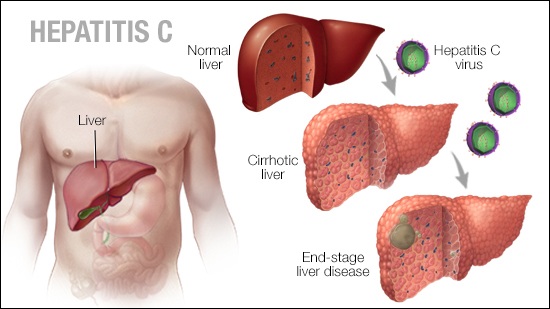Hepatitis C is a liver-related disease which is caused by a virus called hepatitis C virus. The disease is contagious, and transmitted through direct blood contact with the blood of a person having hepatitis C. The HCV damages and inflates the liver tissues, which, if left untreated, may lead to organ damage. Many times people with hepatitis C are not even able to detect it. Some symptoms point towards this disease. If treated in the early stage with ribasure, liver damage can be prevented.
Symptoms
In the early stage, also known as acute hepatitis C, people don’t even know they have the disease as the symptoms are not definitive.
Acute hepatitis C symptoms: Just like any other viral infection symptoms, the person may feel tired, fever, loss of appetite, nausea. Some other symptoms are joint pain, abdominal pain, clay-colored stools, and dark urine. In general, in some people, the body itself fights the hepatitis C virus (HCV) without developing any symptoms and leads to chronic hepatitis C.
Chronic hepatitis C: When the body is unable to fight acute hepatitis C, it leads to chronic hepatitis C. There are no definitive symptoms other than depression or chronic fatigue. The only way to find out about it is to screen blood for donation or a regular blood test. Early treatment can prevent organ damage, and if left untreated, the disease can lead to liver failure, chronic liver disease, cirrhosis, or liver cancer.
Causes
Hepatitis C enters a body through direct blood contact with the contaminated blood. A drop of blood may contain hundreds of HCV, which is not visible to the naked eye. The most common cause is sharing of infected syringe or needles. Ways of contact with contaminated blood:
- Medications through injections
- Needlestick punctures
- From birth, if the mother has hepatitis C
- Unregulated tattoo
- Through razors or toothbrush which came in contact with blood.
- Unprotected intercourse.
Thus, it is always better to use sterilized needles or equipment, and if not possible, then use bleach, alcohol, or boil the equipment to clean it. After using these cleaning, fluids make sure to wash the needles or equipment properly. Hepatitis C cannot be transmitted by sharing food, mosquito bites, kissing, breathing, or regular contact.








 +91-9811604444/ 9811604424/ 9999064250
+91-9811604444/ 9811604424/ 9999064250  8(800)100-47-90
8(800)100-47-90











